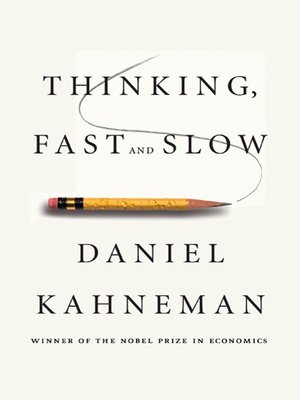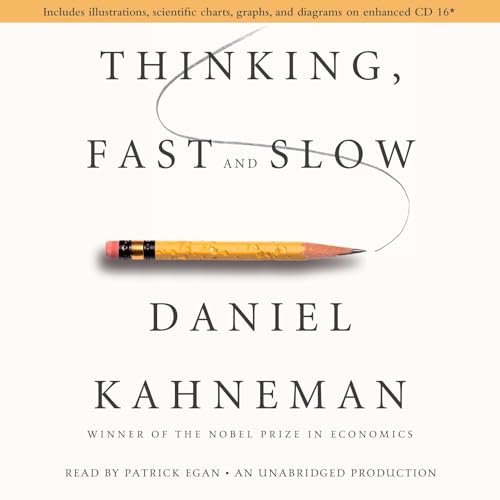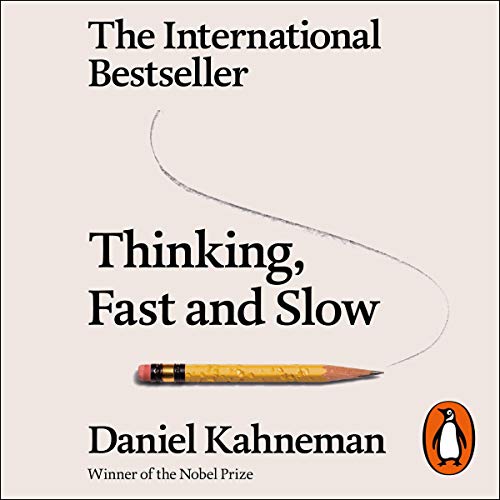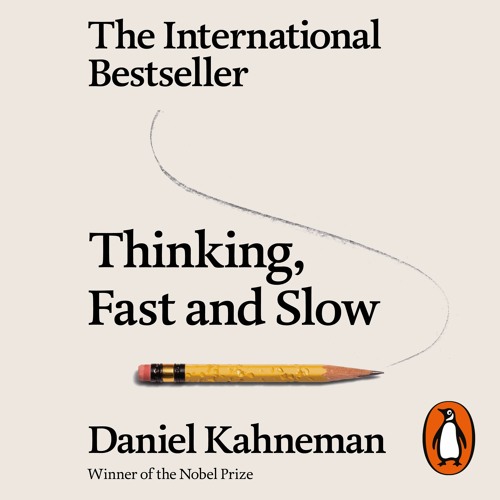**Daniel Kahneman’s “Thinking, Fast and Slow” audiobook explores the two systems of thought: fast, intuitive thinking, and slow, deliberate thinking. It provides insights into decision-making and cognitive biases.
** Daniel Kahneman’s “Thinking, Fast and Slow” audiobook delves into the dual processes of the human mind. It explains how we use two systems of thinking. System 1 is fast, automatic, and emotional, while System 2 is slow, deliberate, and logical.
This book reveals the cognitive biases that influence our decisions. It sheds light on why we often make irrational choices. Kahneman, a Nobel Prize-winning psychologist, offers valuable insights into human behavior. This audiobook is essential for anyone interested in understanding the complexities of the mind. It is a must-listen for those who want to improve their decision-making skills.

Daniel Kahneman’s Journey To ‘thinking, Fast And Slow’
Daniel Kahneman is a renowned psychologist and economist. He is best known for his groundbreaking work in behavioral economics. His book, Thinking, Fast and Slow, has captivated readers worldwide. Let’s explore his journey.
Early Life And Academic Pursuits
Daniel Kahneman was born in Tel Aviv in 1934. He grew up in Paris during World War II. His family moved to Israel after the war. Kahneman earned a degree in psychology from the Hebrew University of Jerusalem in 1954. He later obtained a Ph.D. from the University of California, Berkeley in 1961.
Key Contributions To Behavioral Economics
Kahneman’s work transformed the field of behavioral economics. He challenged traditional economic theories. His research focused on human judgment and decision-making. He introduced concepts like prospect theory and heuristics. These theories explain why people often make irrational choices.
- Prospect Theory: Explains how people value potential losses and gains.
- Heuristics: Mental shortcuts that simplify decision-making.
- Anchoring: Relying too heavily on the first piece of information.
The Genesis Of ‘thinking, Fast And Slow’
Kahneman’s book, Thinking, Fast and Slow, was published in 2011. The book is a culmination of his decades-long research. It explores two systems of thought:
| System 1 | System 2 |
|---|---|
| Fast, automatic, and intuitive | Slow, deliberate, and analytical |
System 1 operates quickly and effortlessly. It is responsible for instinctive reactions. System 2 requires more effort and is used for complex tasks. The book explains how these systems influence our decisions.
Kahneman’s insights have had a profound impact on various fields. His work continues to inspire researchers and thinkers worldwide.

Core Concepts Of ‘thinking, Fast And Slow’ Explored
Daniel Kahneman’s audiobook ‘Thinking, Fast and Slow’ delves into the intricacies of the human mind. The book explains how we think and make decisions. This section explores the core concepts of the book.
System 1 And System 2 Explained
Kahneman introduces two modes of thinking: System 1 and System 2. System 1 is fast and automatic. It operates without conscious thought. It helps us make quick decisions. System 2 is slow and deliberate. It involves conscious effort and reasoning.
System 1 relies on intuition. It handles routine tasks effortlessly. System 2 takes over in complex situations. It requires more mental energy. Understanding these systems can improve decision-making.
Heuristics And Biases
Kahneman explores how we use heuristics to simplify decision-making. Heuristics are mental shortcuts. They help us make quick judgments. But they can lead to biases. Biases are systematic errors in thinking.
Some common biases include:
- Anchoring Bias: Relying too heavily on the first piece of information.
- Availability Heuristic: Overestimating the importance of information that comes to mind easily.
- Confirmation Bias: Seeking out information that confirms our preconceptions.
Prospect Theory And Loss Aversion
Kahneman introduces Prospect Theory to explain how people make choices. The theory shows that people value gains and losses differently. This is known as loss aversion. People fear losses more than they value gains.
For example, losing $50 feels worse than gaining $50 feels good. This affects our decisions and can lead to irrational choices.
Understanding these concepts can help us make better decisions in everyday life.
Impact And Critiques Of The Audiobook
The audiobook of Daniel Kahneman’s “Thinking, Fast and Slow” has left a significant mark. It has influenced many fields. Listeners from various backgrounds find it insightful and thought-provoking. This section explores the audiobook’s impact and the critiques it has received.
Influence On Psychology And Economics
Daniel Kahneman’s work bridges psychology and economics. His audiobook explains how people think and make decisions. It introduces two systems of thinking: fast and slow. This concept is now widely accepted in both fields.
| Field | Impact |
|---|---|
| Psychology | Enhanced understanding of cognitive biases. |
| Economics | Influenced behavioral economics. |
Many psychologists and economists use Kahneman’s findings in their research. The audiobook has become a key resource for students and professionals alike.
Public And Academic Reception
The public and academic communities have praised the audiobook. It has received positive reviews on many platforms. Listeners appreciate its clear explanations and practical examples.
- Public Reviews: High ratings on Audible and other platforms.
- Academic Reviews: Cited in numerous research papers.
- Awards: Winner of several prestigious awards.
Many universities include it in their curriculum. This speaks volumes about its educational value.
Critiques And Counterarguments
Despite its success, the audiobook has faced some critiques. Some listeners find the content dense and challenging. Others argue that it oversimplifies complex concepts.
- Complexity: Some chapters are hard to follow.
- Oversimplification: Critics say it reduces complex ideas.
Supporters counter these arguments by highlighting the book’s accessibility. They believe Kahneman strikes a balance between depth and simplicity. The audiobook remains a valuable resource for understanding human thought processes.

Conclusion
“Thinking, Fast and Slow” by Daniel Kahneman offers profound insights into human decision-making. This audiobook is a must-listen for anyone interested in psychology. Understanding the two systems of thinking can transform your perspective. Dive into Kahneman’s work to enhance your cognitive skills and make better decisions.
Explore this audiobook today!



